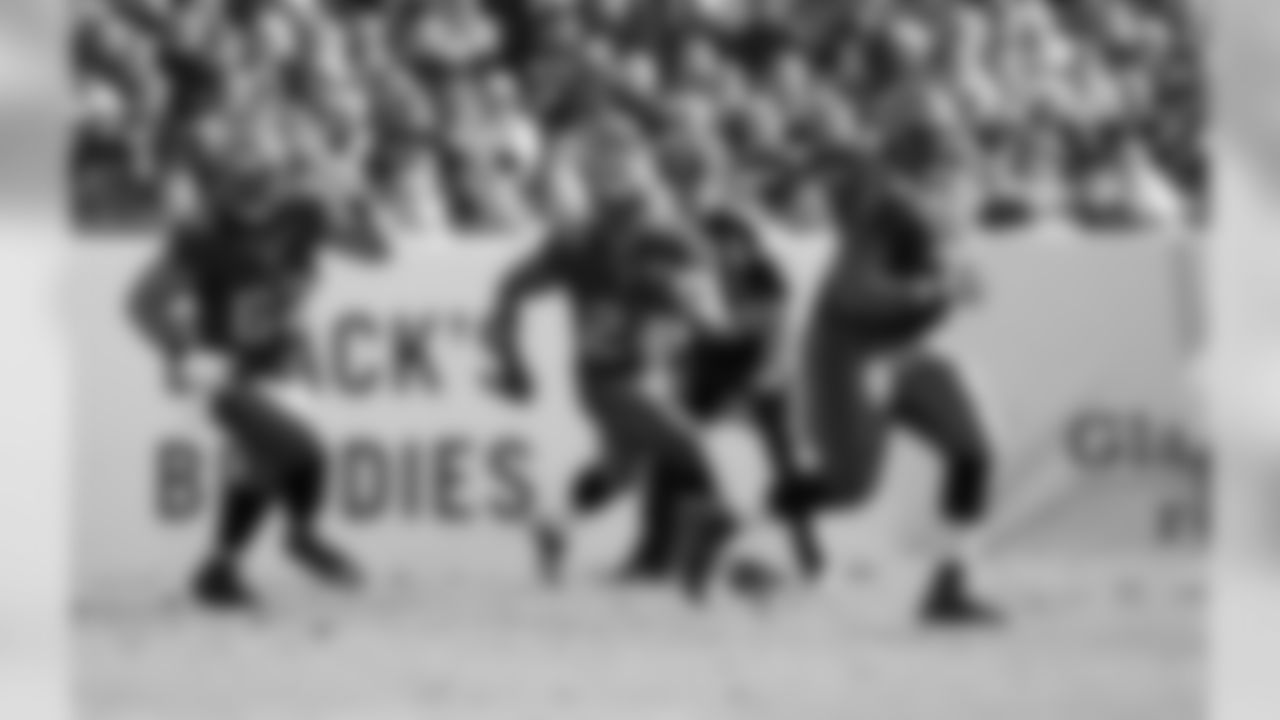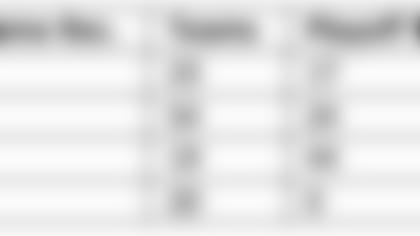Last November, thanks to a response regarding his approach to game-planning, Dirk Koetter was briefly labeled as an "anti-analytics" coach. When it comes to drawing up his play sheet for a specific opponent, Koetter values breaking down tape of that opponent over studying a page of team statistics.
In reality – and has gradually become clear over his two seasons with the Buccaneers, first as offensive coordinator and now as head coach – Koetter uses statistical analysis as much as any coach. Perhaps more than some. In particular, he has studied and distilled the factors that are most correlated with winning and regularly presents his team with a list of statistical goals before a game.
Pictures of the Rams' starting offense and defense, according to the team's depth chart.

17 QB Case Keenum

61 C Tim Barnes

76 LG Rodger Saffold

30 RB Todd Gurley

73 LT Greg Robinson

69 RG Cody Wichmann

79 RT Rob Havenstein

18 WR Kenny Britt

46 TE Corey Harkey

88 TE Lance Kendricks

11 WR Tavon Austin

25 SS T.J. McDonald

26 S Mark Barron

52 LB Alec Ogletree

31 FS Maurice Alexander

90 DT Michael Brockers

99 DT Aaron Donald

95 DE William Hayes

94 DE Robert Quinn

22 CB Trumaine Johnson

20 CB Lamarcus Joyner

21 CB Coty Sensabaugh
The distinction, as is always the case with statistics, is how they are wielded. Numbers can be illuminating, even predictive. For Koetter, they will never take the place of the scouting he can do with his own eyes, but they can assist in that process.
That's our goal with Football Geekery. Each week, we're going to give you a sampling of statistical and/or historical analysis, hopefully in a way that is relevant to the Buccaneers' current state of affairs. This week we follow up on Buccaneer coaches believing that when a defense ends a takeaway drought, the turnovers tend to come in bunches. We also identify some of the longest consecutive-game streaks in team history, such as the run of outings with a touchdown catch that Mike Evans is chasing. Finally, we look into the difference a 2-1 start to a season makes versus a 1-2 beginning.
**
1. Turnovers in Bunches
Koetter's team is off to a 1-1 start despite opening with two road games, and that would be a surprising record if you were given only one stat from those two weeks: Tampa Bay is a league-worst negative-six in turnover ratio. The Buccaneers are one of three teams that has yet to record a takeaway (also the Seahawks and Giants), marking the first time in 41 seasons that Tampa Bay has gone two weeks into a season without one.
Five of the Bucs' six giveaways came in a Week Two loss at Arizona. The other didn't hurt as much, as it was a slight blemish on a big road win in Atlanta. That happened to be just the 10th time that Tampa Bay has ever won a game without forcing a single turnover.
Obviously, getting shut out in the turnover department is not part of the Bucs' equation for winning consistently. Given that there have been only two three-game runs of zero-takeaway games in team history, the Buccaneers expect to get their first one very soon. And maybe their second one soon after that. And hopefully a third.
"We work on it a lot, and I think when they come they usually come in bunches," said Koetter of forcing turnovers.
Koetter's defensive coordinator, Mike Smith, obviously expected his group to have some takeaways by this point, but he also thinks that situation could turn around quickly.
"Like every defensive staff, we preach, 'Attack the ball,'" said Smith. "They haven't come our way in the first two ballgames – we have faced, I think, two outstanding quarterbacks in the first two ballgames – but we're going to continue to preach. And usually, my experience has been they come in numbers. When you start getting them, they start coming."
Koetter and Smith speak from experience, but is their intuition right about turnovers coming in bunches? Will the first one, when it finally comes, open the floodgates, so to speak? Buccaneers history suggests that it will.
The team's current streak marks just the 15th time that the Bucs have gone consecutive games without forcing a single turnover. Two of those 15 streaks actually went to three games, once in 1984 and once near the end of last season. Two of those streaks were comprised of the last game of one season and the first game of the second, so aren't particularly relevant.
That leaves 12 previous runs of two or more games in team history in which the Buccaneers did not force a single turnover. In the games that followed immediately after those streaks, the team averaged three takeaways per outing…so, yes, they did come in bunches. In fact, in most cases, the turnover explosion stretched on for several games. For instance, in 2007 the playoff-bound Bucs played a pair of games just before midseason in which they did not create a turnover. Over the final eight games, they took it away 23 times.
Below are all 12 of those streaks and the turnover results from the very next game as well as the combined totals next three games that followed the droughts.

In all but two of those instances, the Bucs got at least two takeaways in the next game, and in nearly half of them they got at least three. The average was 2.4 turnovers forced in the game that broke the streak.
More to the point in terms of the belief that the turnovers would come in bunches once they begun, there are four instances above where the Bucs racked up a whopping nine or more turnovers over the next three games. The average was nearly six takeaways over the three-game spans, which the Buccaneers' defense would likely be quite happy with in its upcoming matchups with Los Angeles, Denver and Carolina.
2. Streakin'!
A look back at all of the match-ups between the Buccaneers and the Rams.

Dec. 17 2015, L 31-23

Sep. 14 2014, L 17-19

Dec. 22 2013, L 23-13

Dec. 23 2012, L 13-28

Oct. 24 2010, W 18-17

Sep. 23 2007, W 24-3

Oct. 18 2004, L 28-21

Sep. 23 2002, W 26-14

Nov. 26 2001, W 17-24

Dec. 18 2000, W 38-35

Dec. 11 1994, W 24-14

Dec. 6 1992, L 27-31

Sep. 16 1990, L 14-35

Oct. 5 1986, L 26-20

Oct. 13 1985, L 27-31

Nov. 25 1984, L 33-34

Sep. 11 1980, W 10-9

Sep. 23 1979, W 21-6

Jan. 6 1980, L 0-9 (playoff game)Not Pictured:Jan. 23 1999, L 11-6 (playoff game)Nov. 29 1987, L 35-3Nov. 5 1978, L 26-23Nov. 6 1977, L 31-0
Wide receiver Mike Evans is off to a good start for the Buccaneers in 2016, totaling 169 receiving yards in two games and scoring in each outing. That actually has Evans halfway to the team record for consecutive games with a touchdown reception, a record he already shares with four other former Buccaneers. Evans caught a scoring pass in four straight games during his 2014 rookie season from Nov. 2-23. The other Bucs to have matched that were Mike Williams over the last three games of 2010 and the opener of 2011; Antonio Bryant in 2008; Joey Galloway in both 2004 and 2005; and Bruce Hill, who did it first in 1988.
So Evans could put himself alone in that category with scores against Los Angeles, Denver and Carolina over the next three weekends. Just for fun, below are the Buccaneers records for consecutive-game streaks in a number of other statistical categories, as well as the player with the longest active streak in each category. The streaks only count action with the Buccaneers, not any runs that may have begun or ended with another team, and they only consider regular-season games. Many of the streaks below were found using the very entertaining "Play Index" tools on the Pro Football Reference website.
Games Started*
Record: Ronde Barber, 215, 1999-2012
Active: Doug Martin, 24, 2014-Present
Games Played*
Record: Ronde Barber, 240, 1998-2012
Active: Andrew DePaola, 34, 2014-Present
Touchdowns Scored
Record: Earnest Graham, 6, Nov. 4-Dec. 16, 2007
Active: Mike Evans, 2, 9/11/16-Present
Rushing Touchdowns
Record: Earnest Graham, 6, Nov. 4-Dec. 16, 2007
Active: n/a
Touchdown Passes
Record: Josh Freeman, 15, Oct. 10, 2010-Sept. 18, 2011
Active: Jameis Winston, 2, 9/11/16-Present
100 Rushing Yards
Record: James Wilder, 6, Dec. 9, 1984-Sept. 29, 1985
Active: n/a
50 Rushing Yards
Record: Errict Rhett, 13, Nov. 13, 1994-Oct. 8, 1995
Active: n/a
100 Receiving Yards
Record: Mark Carrier, 4, Dec. 3-24, 1989
Active: n/a
50 Receiving Yards
Record: Keyshawn Johnson, 15, Dec. 18, 2000-Dec. 16, 2001
Active: Mike Evans, 5, Dec. 17, 2015-Present
300 Passing Yards
Record: Vinny Testaverde, 3, Oct. 22-Nov. 5, 1989
Active: n/a
200 Passing Yards
Record: Josh Freeman, 9, Sept. 30-Dec. 2, 2012
Active: Jameis Winston, 5, Dec. 17, 2015-Present
* Streaks are considered broken when the player does not appear in or start a game that is played.
3. A Pivotal Game Three?
After a rousing win in Atlanta to start the 2016 season, the Buccaneers absorbed a disappointing loss in Arizona in Week Two. Tampa Bay was one of only four teams that started the season with two road games, and they matched Cincinnati and Green Bay in going 1-1 under those conditions. The Miami Dolphins lost both of their season-opening road games.
As Offensive Coordinator Todd Monken noted earlier in the week, that 1-1 start was less than what the team had hoped for but still a decent way to kick off the campaign, all things considered.
"We started off two games on the road," said Monken. "We don't want to get too out front, but bottom line is we split, starting on the road. That's not too bad. We can't let one loss and the way we played lead to another loss and another loss. We're not changing what we do. We are who we are. We believe in what we do. We've just got to do it better."
The Bucs' 1-1 start on the road will look even better if they can take their two upcoming home games against Los Angeles and Denver. Without looking ahead to the Broncos, a 2-1 record after Week Three would have a much better look to it than 1-2.
How much of a difference would there really be between those two possible three-game records? Perhaps not quite as much as you would imagine.
Pictures of the Top 10 Rams in week 2, according to their Pro Football Focus player grade.

95 DE William Hayes (76.9)

18 WR Kenny Britt (77.7)

26 LB Mark Barron (78.8)

20 CB Lamarcus Joyner (78.9)

79 G Rodger Saffold (79.2)

90 DT Michael Brockers (82.1)

25 SS T.J. McDonald (82.5)

31 FS Maurice Alexander (83.4)

52 LB Alec Ogletree (87.4)

99 DT Aaron McDonald (94.8)
Discounting tie games because the Bucs have only had one of them in 40+ seasons and none during the first three games of any year, there are four possible three-game starts: 0-3, 1-2, 2-1 and 3-0. It probably comes as no surprise that Buccaneers teams that have started off 0-3 have almost universally done poorly, with a combined .218 winning percentage. Equally unsurprising is that every 3-0 Buccaneers squad has gone on to win at least 10 games, with a combined winning percentage of .641.
Neither of those records is possible for the Buccaneers this year, however. It's 1-2 or 2-1 (barring a tie on Sunday), and the results from seasons with those starting records aren't quite as polarized as the 0-3 and 3-0 crowds. Here's how the Bucs have fared in the first three games of their 40 previous seasons:

Yes, the Buccaneers have made the playoffs in four of the 13 seasons in which they've started 2-1, as compared to 1 of the 10 in which they've started 2-1. The overall winning percentage is not drastically different, however.
How about around the NFL as a whole? Last year, seven teams started 3-0 and all but one of them (Atlanta) made the playoffs, while the four 0-3 teams all missed out. There were six 2-1 teams after three weeks, but only two made the playoffs, while four of the 15 2-1 squads managed to qualify for the postseason. That's 33.3% of the 2-1 teams to move on, and 26.7% of the 1-2 clubs.
The numbers are similar over the last five years combined. One thing for certain: You don't want to start out 0-3. Twenty teams did that from 2011-15 and none of them made the playoffs. Most 3-0 teams saw their seasons extend into January, although six of the 23 surprisingly did not. In the middle were 24 teams that started 2-1 and made the playoffs compared to 19 teams that started 1-2 and made the playoffs.

Yes, a 2-1 start is better than a 1-2 start, but the difference isn't enough to be depressing for whichever team loses Sunday's Raymond James Stadium matchup between the 1-1 Buccaneers and the 1-1 Rams.






















